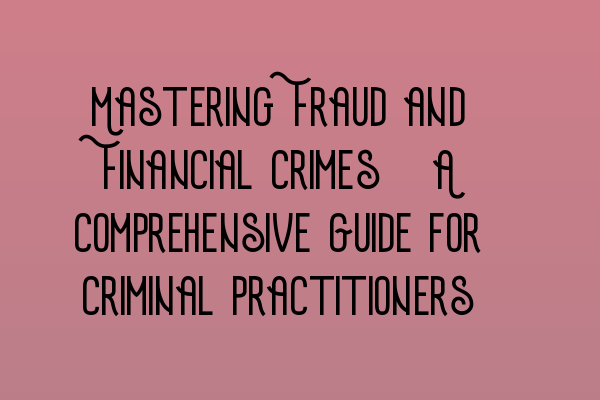Mastering Fraud and Financial Crimes: A Comprehensive Guide for Criminal Practitioners
As criminal practitioners, it is crucial to have a comprehensive understanding of fraud and financial crimes. These offenses require specialized knowledge and skills to effectively represent clients and navigate through the complexities of these cases. In this guide, we will explore key aspects of fraud and financial crimes, providing valuable insights and practical tips to help you excel in this field.
Understanding Fraud and Financial Crimes
Fraud and financial crimes encompass a wide range of illegal activities committed with the intention to deceive and obtain financial gain. It is essential for criminal practitioners to grasp the different types of fraud and financial crimes, including but not limited to:
- Bank Fraud: Deceptive practices targeting financial institutions or exploiting banking systems.
- Identity Theft: Unauthorized use of someone else’s personal information for fraudulent purposes.
- Securities Fraud: Fraudulent activities in the stock market, such as insider trading or misleading investors.
- Mortgage Fraud: Deception or misrepresentation in mortgage-related transactions.
- Money Laundering: Concealing the origins of illegally obtained funds to make them appear legitimate.
By familiarizing yourself with the various types of fraud and financial crimes, you can tailor your defense strategies to suit each specific case and ensure the best possible outcome for your clients.
Investigation and Evidence Gathering
An integral part of successfully dealing with fraud and financial crimes is conducting thorough investigations and gathering compelling evidence. It is crucial to collaborate with forensic accountants, financial experts, and other professionals to uncover financial discrepancies, trace money trails, and analyze complex transactions.
Furthermore, staying updated with the latest investigative techniques and technologies can enhance your ability to gather strong evidence. Continuous professional development through SQE 1 Practice Exam Questions and SQE 1 Practice Mocks FLK1 FLK2 can provide you with the necessary tools and knowledge to excel in this field.
Keeping in mind that the legal landscape is constantly evolving, understanding the legal frameworks and regulatory environments related to fraud and financial crimes is essential. Remaining well-informed about relevant legislations and precedents will enable you to build strong defenses and challenge the prosecution’s case effectively.
Effective Litigation Strategies
When it comes to navigating fraud and financial crime cases in the courtroom, having effective litigation strategies is crucial. Every case is unique, and you must be adaptable and strategic in your approach. Here are some key strategies that can contribute to your success:
- Thorough Case Analysis: Carefully examine the evidence, identify any weaknesses in the prosecution’s case, and build a strong defense strategy accordingly.
- Expert Witness Testimony: Utilize the expertise of forensic accountants, financial analysts, and other specialists as expert witnesses to strengthen your arguments.
- Evidence Presentation: Present complex financial evidence in a manner that is easily understandable to the judge and jury.
- Effective Cross-Examination: Skillfully question witnesses to expose inconsistencies or credibility issues to weaken the prosecution’s case.
- Negotiation Skills: Explore opportunities for plea bargains or mitigated sentences when appropriate, while always prioritizing your client’s best interests.
Do not underestimate the value of continuous learning and professional development. SQE 2 Preparation Courses and SQE 1 Preparation Courses can equip you with the necessary skills, knowledge, and strategies to become a highly proficient criminal practitioner in the field of fraud and financial crimes.
Upcoming SRA SQE Exam Dates
Being aware of the upcoming SRA SQE exam dates is crucial for criminal practitioners looking to enhance their qualifications and stay ahead in their careers. By checking the SRA SQE Exam Dates, you can plan and prepare accordingly to avoid missing out on the opportunity to further validate your expertise in fraud and financial crimes.
In conclusion, mastering fraud and financial crimes as a criminal practitioner requires continuous learning, staying updated with industry developments, and leveraging your skills and expertise to build strong defense strategies. By integrating SQE 1 Practice Exam Questions, SQE 1 Practice Mocks FLK1 FLK2, SQE 2 Preparation Courses, and SQE 1 Preparation Courses into your professional development, you can enhance your abilities and confidently represent your clients in the complex world of fraud and financial crimes.
